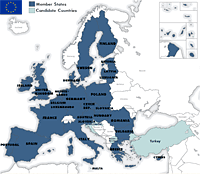The European Union
Information on European Union (EU) compiled by Society for American Sovereignty TM.
Commentary on the European Union
-
 EU wins power to jail national citizens ... EU court judgement strikes at the heart of national democracy and sovereignty
EU wins power to jail national citizens ... EU court judgement strikes at the heart of national democracy and sovereignty
"The EU has been given the power to compel the national courts of its 25 Member States to fine or imprison people for breaking EU laws, even if a country's own Government and Parliament are opposed to that. An unprecedented ruling yesterday by the EU Court of Justice in Luxembourg gives Brussels the power to introduce harmonised criminal law across the EU, creating for the first time a body of European criminal law that all Member States must adopt. "
- The Fjordman Files
- Who governs Britain , EU Referendum blog (September 9, 2005)
"It is ludicrous that over 60 percent of the laws imposed upon the fourth largest economy in the world are created by people who have not been elected and cannot be removed in elections."
- Cry Freedom for St. George and England... a thousand rally in Trafalgar Square, Soverenty.org.uk (April 21, 2002)
A burning hot Sunday 21 April 2002 saw around a thousand people march through Central London under the banner "Crown, Pound and Democracy"...
"We also recognise that while the EU is clearly a threat to the self-government of Britain, it is also a fact that the EU takes its orders from the WTO, which takes its orders from powerful corporations, US financial lobbies and other vested interests. These powers are also above and beyond any democratic reach, and are often able to put the financial squeeze on national governments. In effect, our political system ensures that our politicians and our government take their orders from everybody but us!
In this wider sense, the EU is but one arm of an octopus which threatens to strangle us all..."
History of the European Union
- Steps Leading to the Euro, European Union, Delegation of the European Commission to Japan (2007)
- History of the European Union - Jean Monnet (1888-1979) (video, 1 minute)
- A timeline of the EU, BBC (March 12, 2007)
- European Union Timeline, European Commission Representation in Bulgaria (2007)
- Timeline: EU through the years, CBC News (May 30, 2005)
- EU Timeline: 2000s, Plymouth City Council (UK) (2007)
- European Union timeline, by Patrick Barkham, Guardian Unlimited (December 30, 1998)
- Integration by Stealth? The Role of the European Court of Justice in European Integration - course description by Morten Rasmussen, Kobenhavens Unervisitet (2007)
"The European Court of Justice (ECJ) has played a prominent role in the process of European integration over the last fifty years. While originally created to check and balance the Commission, the ECJ chose in the early 1960s - much to the surprise of the member states - to establish a strong, federal-like European law. This constitutionalisation of the European Union (EU) was to become a defining characteristic with immense consequences for European policy making and the stability of the EU.
This course will analyse the role and impact of the ECJ over the last fifty years. The central questions will be to understand how and why the ECJ took the bold step towards the constitutionalisation of the EU and why the member states eventually accepted this." - The Great Deception, review of book by Christopher Booker and Richard North, Continuum, ISBN 0826471056, 474pp,(2003)
Websites on the European Union
Reports, Documents, and Legal References on the European Union
- EUR-Lex : direct free access to European Union law
- The European Union, CIA Fact Book (August 16, 2007)
"The evolution of the European Union (EU) from a regional economic agreement among six neighboring states in 1951 to today's supranational organization of 27 countries across the European continent stands as an unprecedented phenomenon in the annals of history."
- Germany in the European Union: Economic Policy under Ceded Sovereignty, University of Connecticut, Dept. of Economics, Horst Siebert, published by Kiel Institute for the World Economy (2004)
"The member states of the European Union have given up sovereignty in quite a number of policy areas and subjected themselves to joint decisionmaking at the European level. Policy instruments are no longer available nationally in many policy areas, including monetary policy, trade policy, the more important part of competition policy, subsidy control, and a large number of the regulations in the product market, the environmental arena, and the capital market. The maneuvering space for national economic policy-makers has been reduced considerably. In quite a few areas in which decisions are taken with a qualified majority, the member countries can be outvoted and have to accept the decisions taken by others. This paper surveys the new decision space of economic policy of a member state including the latest constitutional arrangement."
More articles on the European Union
Please see our EU articles section for a selection of articles on the European Union.

